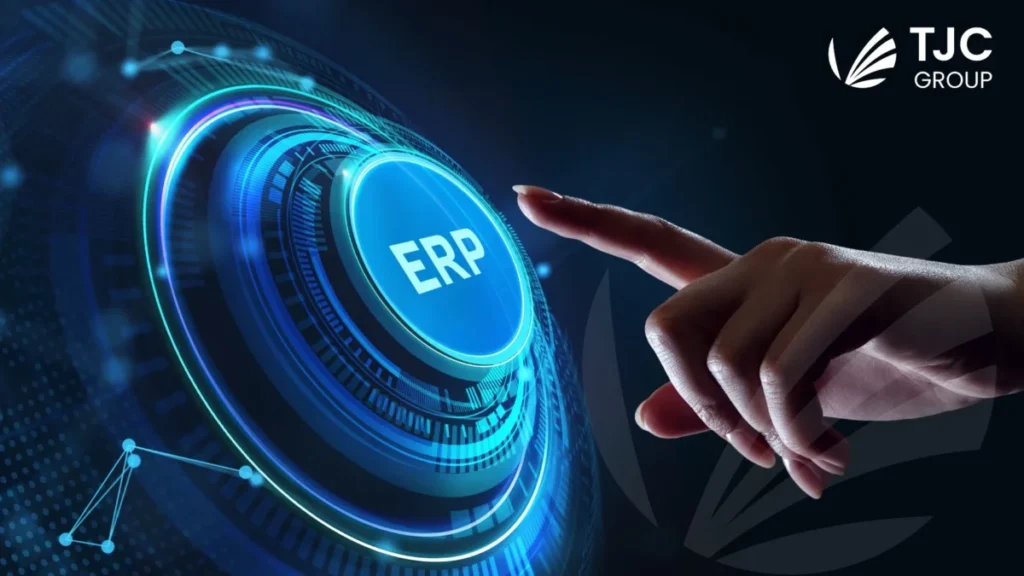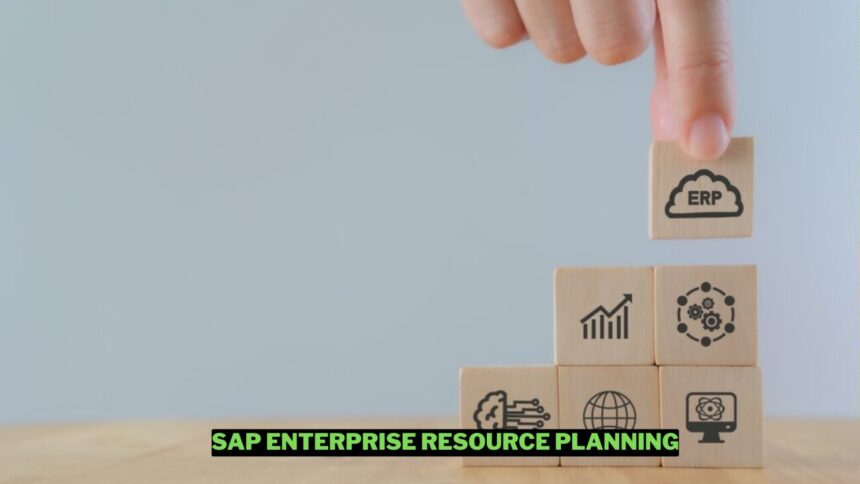If your business aims to improve its productivity, organization, and flexibility, SAP ERP can be an extremely useful tool. But what exactly is SAP ERP, and why is it worth considering for your business?
Is it only beneficial for large corporations, or can small and medium-sized enterprises also take advantage of it? Let’s delve into the various features, advantages, and capabilities of this robust enterprise software solution.
You Might Also Like:
What Is SAP Enterprise Resource Planning (ERP)?

SAP ERP refers to a software solution offered by SAP SE that aids in enterprise resource planning. SAP stands out in the ERP market due to its significant market dominance. With approximately 39,668 companies and 75,000 customers in 120 countries relying on it, SAP ERP has gained immense popularity.
What Is SAP?
SAP ERP, also known as Systems, Applications, and Products in Data Processing, is a versatile software that integrates and simplifies multiple business operations and tasks. This includes functions like finance, accounting, procurement, supply chain management, and human resources, all within a unified system.
SAP was the pioneering solution that introduced the concept of customizable modules and components, enabling users to select and utilize specific features based on their company’s requirements.
SAP ERP is a flexible system that can be customized and implemented in different ways, such as on-premises, cloud-based, or a combination of both. The functionalities and workflows of the ERP will be tailored to meet the specific needs and activities of each organization.
What Is ERP?
SAP ERP, also known as enterprise resource planning, is a software system that enables companies to effectively manage and optimize their key business operations. By integrating various departments like sales, marketing, and finance, SAP ERP provides real-time information and facilitates quick access to data. This helps organizations streamline their processes and make informed decisions.
SAP ERP is a solution that helps businesses avoid the challenges of operating with isolated and disjointed systems. By not having a centralized and reliable source of information, businesses may suffer from decreased efficiency.
For instance, the finance department may rely on spreadsheets for recording financial transactions, while the sales teams have to manually request financial data to access revenue and sales information. This manual and fragmented process can result in significant financial losses for the company.
How does the SAP ERP system work?
SAP ERP, also known as SAP ECC, is a software system that is typically implemented on-premises. It follows a client-server architecture, divided into three tiers: presentation, application, and database. The presentation tier allows users to interact with the system through the SAP graphical user interface (SAP GUI).
This interface can be installed on computers running either Microsoft Windows or macOS, and serves as the main communication channel between the user and the ECC platform. SAP ERP, or Enterprise Resource Planning, consists of two main components: the application tier and the database tier.
The application tier serves as the central hub of ECC, handling various tasks such as processing transactions, executing business logic, generating reports, overseeing database access, printing documents, and facilitating communication with external applications. On the other hand, the database tier is where all transaction records and other data.
Types of SAP software
Many versions of SAP software exist, including previous iterations SAP R 2 and SAP R 3. Some current types of SAP software include:
SAP S or 4HANA
SAP ERP, specifically SAP S/4HANA, is a top choice for medium and large businesses as it provides a comprehensive solution for both analytics and transaction processing. This software is particularly beneficial for industries that heavily rely on real-time analytics, such as banking, hospitality, security, and airlines.
SAP S or 4HANA Cloud
SAP ERP, also known as SAP S/4HANA Cloud software, provides regular updates and allows users to access it through a web browser. This software incorporates in-memory computing, analytics, and machine learning capabilities. It is particularly beneficial for medium and large businesses.
SAP Business One
SAP ERP is a software that can be used with either SAP HANA or Microsoft SQL. It is particularly suitable for organizations that have a workforce of up to 350 employees.
The SAP Business One suite offers over 500 third-party integrations, making it convenient for businesses to tailor the software according to their specific requirements.
Moreover, Business One offers a flexible pricing model that can be customized to match the available configurations.
SAP Business ByDesign
SAP ERP is a software solution that is ideal for medium-sized businesses. It caters to organizations with a workforce ranging from 250 to 1,500 employees.
Specifically designed for industries like manufacturing, wholesale distribution, and the public sector, SAP ERP offers tailored functionalities to meet their specific needs.
The pricing model of the Business ByDesign suite is based on the number of users, enabling smaller businesses to pay proportionately less than larger enterprises.
The Process of SAP ERP
SAP ERP is a system that consolidates data, making it easily accessible for all departments within a business. This centralized information enables smooth facilitation of the sales processes, starting from the procurement of raw materials to the delivery of the final products to customers.
In a nutshell, let’s understand how the SAP ERP process generally operates.
1. Product Acquisition
During the initial stage, a customer contacts the sales team to acquire a product. With the help of SAP, a sales representative can verify the availability of raw materials for production or determine if they need to be sourced from external suppliers.
SAP ERP is a system that centralizes all information regarding product inventory on a database. With this system, sales teams can access real-time information about the availability of merchandise without the need to consult other departments. If the product is indeed available, it will be promptly packaged, delivered, and shipped to the customer.
2. Product Planning
SAP ERP, which stands for Systems, Applications, and Products in Data Processing, is a software solution that helps businesses manage their resources and operations efficiently. In situations where a particular product is not available, the ERP system receives a manufacturing request. Additionally, the
SAP ERP provides a centralized database that enables the Product Planning Department to receive real-time updates on raw materials. This eliminates the need for employees to manually input duplicate data as the system promptly identifies any duplication.
3. Product Manufacturing
SAP ERP is a software solution that facilitates the production of goods on the shop floor. Throughout this process, a centralized database is constantly updated with information regarding manufacturing speed and efficiency.
Additionally, the HR department initiates the recruitment process and thoroughly assesses each candidate to ensure they meet the workforce needs.
4. Payment Processing
SAP ERP, also known as SAP Enterprise Resource Planning, is a software solution that facilitates the smooth flow of business operations. Once the product is sold and sent to the customer, the finance department handles payment processing and uploads invoices onto the SAP ERP system.
By utilizing SAP ERP, the system ensures that invoices are promptly processed and also provides accurate records of revenue, costs, and sales to meet the needs of the workforce.
Key Features of SAP ERP
SAP S/4HANA Cloud is a modern ERP system that incorporates advanced technologies like AI, machine learning, and analytics. This system revolutionizes business operations by implementing intelligent automation specifically designed for cloud-based deployment. Now, let’s explore some of the essential aspects and functionalities of SAP ERP.
Asset management
SAP ERP is a comprehensive software solution that effectively manages the maintenance requirements of all equipment within your system. It facilitates the seamless coordination of maintenance planning, scheduling, and execution, ultimately optimizing operational time.
Finance
SAP ERP is a comprehensive software solution that simplifies and improves financial processes. It covers a wide range of activities, including transactions, analytics, planning, and managing enterprise risk and compliance.
Manufacturing
SAP ERP is a comprehensive software solution that facilitates various aspects of the product design process and effectively manages the entire product life cycle. With SAP, businesses can streamline production engineering, enhance product operations, ensure quality management, and gain
Sales
SAP ERP is a software solution that focuses on managing contracts, sales orders, and ensuring the accuracy and consistency of sales data.
Research and product engineering
SAP ERP is a comprehensive software solution offered by SAP that allows businesses to effectively manage every stage of the product life cycle, from initial development to manufacturing.
This advanced system also encompasses various tasks related to enterprise portfolio management, project management, product compliance, and product life cycle management.
Service Master Agreement and data management
SAP ERP is a comprehensive software solution that is designed to enhance service outcomes and drive profitability. It offers various features such as service master data and agreement management, service parts management, subscription order management, financial shared services management, and service operations management.
Sourcing and procurement
SAP ERP is a software solution that offers various functionalities for procurement and purchase order processing. It includes tools for managing operational procurement, handling invoices, centralizing procurement activities, sourcing goods and services, managing contracts, and overseeing supplier relationships.
Supply chain management
SAP ERP, short for System Applications and Products in Data Processing, is a software solution that provides comprehensive insights into various aspects of the supply chain. With its specialized modules, SAP ERP enables businesses to analyze sales, purchases, stock transport orders, and inventory management.
Bottom Line
SAP ERP is a flexible software solution that caters to diverse industries and serves multiple purposes. It offers various modules or components that can be customized to meet the specific requirements of businesses.
While it can be used by different types of organizations, it is predominantly utilized by large corporations and enterprises to optimize and streamline their key business operations.





